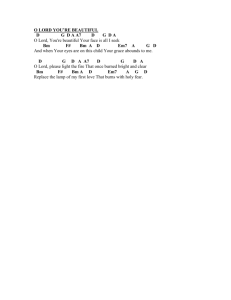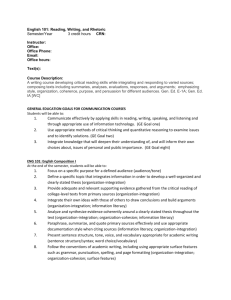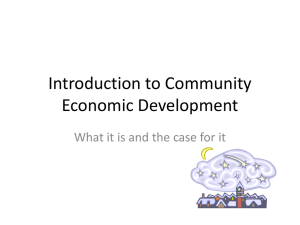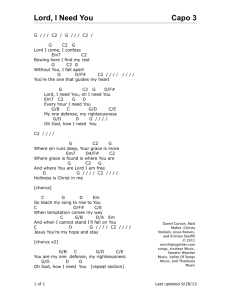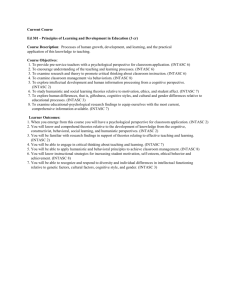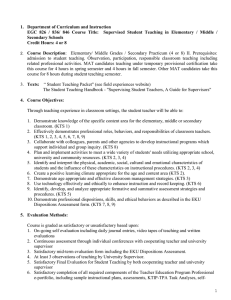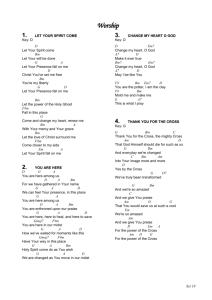Department of Curriculum and Instruction EDF 320, Human
advertisement
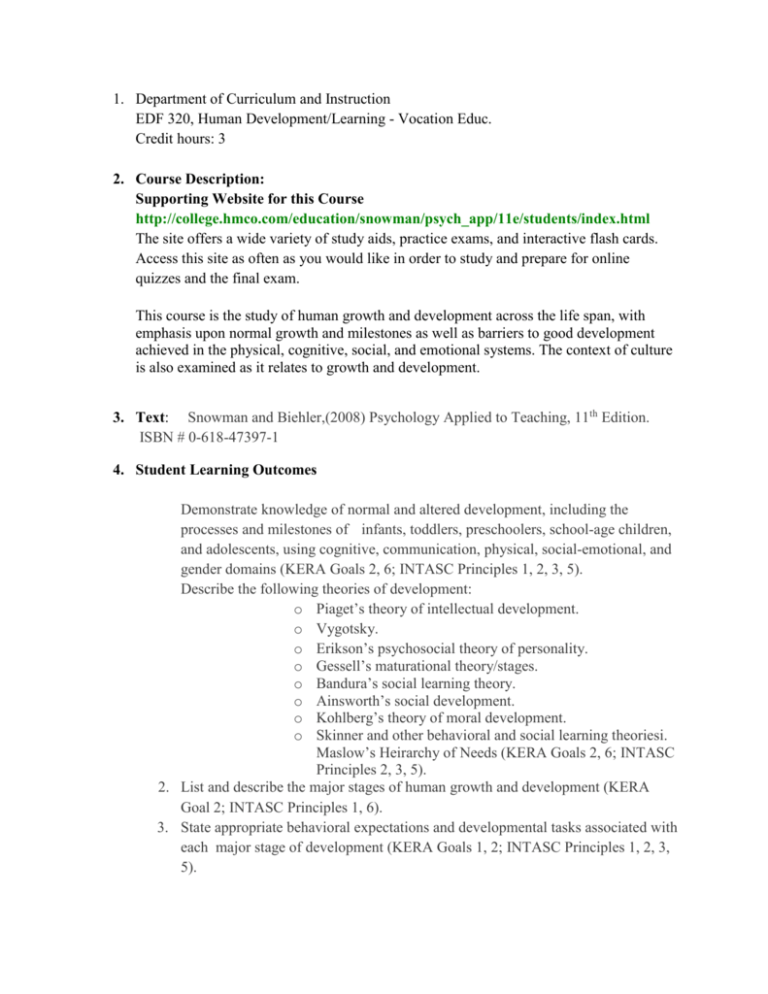
1. Department of Curriculum and Instruction EDF 320, Human Development/Learning - Vocation Educ. Credit hours: 3 2. Course Description: Supporting Website for this Course http://college.hmco.com/education/snowman/psych_app/11e/students/index.html The site offers a wide variety of study aids, practice exams, and interactive flash cards. Access this site as often as you would like in order to study and prepare for online quizzes and the final exam. This course is the study of human growth and development across the life span, with emphasis upon normal growth and milestones as well as barriers to good development achieved in the physical, cognitive, social, and emotional systems. The context of culture is also examined as it relates to growth and development. 3. Text: Snowman and Biehler,(2008) Psychology Applied to Teaching, 11th Edition. ISBN # 0-618-47397-1 4. Student Learning Outcomes Demonstrate knowledge of normal and altered development, including the processes and milestones of infants, toddlers, preschoolers, school-age children, and adolescents, using cognitive, communication, physical, social-emotional, and gender domains (KERA Goals 2, 6; INTASC Principles 1, 2, 3, 5). Describe the following theories of development: o Piaget’s theory of intellectual development. o Vygotsky. o Erikson’s psychosocial theory of personality. o Gessell’s maturational theory/stages. o Bandura’s social learning theory. o Ainsworth’s social development. o Kohlberg’s theory of moral development. o Skinner and other behavioral and social learning theoriesi. Maslow’s Heirarchy of Needs (KERA Goals 2, 6; INTASC Principles 2, 3, 5). 2. List and describe the major stages of human growth and development (KERA Goal 2; INTASC Principles 1, 6). 3. State appropriate behavioral expectations and developmental tasks associated with each major stage of development (KERA Goals 1, 2; INTASC Principles 1, 2, 3, 5). 4. Describe the major theories of motivation and their implications for classroom learning and management (KERA Goals 1, 2, 3, 4, 6; INTASC Principles 2, 3, 5). 5. From directed observations, students will gain knowledge of normal and abnormal responses of children at various ages in a learning environment (KERA Goals 1, 2, 3, 5, 6; INTASC Principles 2, 3, 5). 6. Construct a matrix of development for ages birth through 14 years, including information from the aforementioned theorists (KERA Goals 1, 2, 3, 5, 6; INTASC Principles 2, 3, 5). 7. Gain knowledge of how physical, neurological, social, environmental, and cultural barriers can affect the learner’s growth and development at all ages (KERA Goals 2, 4, 6; INTASC Principles 2, 5). 8. Describe four developmental research designs and cite the strengths and limitations of each (KERA 1, 6; INTASC Principle 6). 9. To synthesize research from journals, the Web, and other sources in addressing research questions about teaching and learning (KERA Goals 1, 5; INTASC Principle 6). 10. Assemble an electronic portfolio to demonstrate objectives learned throughout the semester, including a summative reflection (KERA Goals 1, 5; INTASC Principles 1, 2, 5, 9) 5. Evaluation Assignment Percent of Grade Weekly Quizzes (Individual Work) 30% Weekly Participation on Dis. Board 20% Summary of Article 10% Final Examination 40% Grading System 90 – 100 A 80 – 89 B 70 - 79 C 65 – 69 D Below 65 F 6. Student Progress: Students will receive a midterm grade before the last day to withdraw. 7. Attendance Policy: Absences equating 20% of class meetings will result in automatic failure. Class sessions missed as a result of late entry will be counted as absences. The student is responsible for presenting adequate reason for absence to the instructor in order to be given the opportunity to make up missed work. (Adequate reasons include personal illness, death or serious illness in the immediate family, or participation in an approved university activity.) 8. Last Date to Drop the Course: Last day to drop course or to withdraw from the University listed Colonel’s Compass http://www.eku.edu/compass/ 9. Disability Statement: If you are registered with the Office of Services for Individuals with Disabilities, please make an appointment with the course instructor to discuss any academic accommodations you need. If you need academic accommodations and are not registered with the Office of Services for Individuals with Disabilities, please contact the Office on the third floor of the Student Services Building, by email at disserv@eku.edu or by telephone at (859)622-2933 V/TDD. Upon individual request, this syllabus can be made available in alternative forms. 10. Academic Integrity Statement: Students are advised that EKU’s Academic Integrity policy will strictly be enforced in this course. The Academic Integrity policy is available at www.academicintegrity.eku.edu. Questions regarding the policy may be directed to the Office of Academic Integrity. 11. Course Requirements 1. Stay current with all assignments and meet deadlines specified in modules. 2. Check your e-mail account daily. 3. Check the course site daily. 4. Actively read and review textbook-chapter assignments and online articles. 5. Respond to weekly quizzes 6. Participate in small group assignments (as needed) including chats/discussions. 7. Participate in chat sessions (if needed) and all discussion board assignments. 8. Actively participate in reading and responding to classmates’ ideas on the Discussion 9. and Board. In the 4th week students will report on a current issue or trend related to teaching learning. Each student will post a summary of an article from a professional journal 10. (with the citation or reference noted) on the Discussion Board for feedback from classmates. Complete the final examination at the end of the course. 12. Course Outline Module 1 Chapter 1 Getting Acquainted and Applying Psychology to Teaching Chapters 2-3 Theories of Psychosocial and Cognitive Development, Age-level 1. Characteristics Erikson Ainsworth Kohlberg Piaget Vygotsky Other Theorists The Contribution of Language Module 2 Individual Differences and Thinking Chapters 4-6 Intelligence Learning Styles Creativity Concept Formation Reasoning Problem Solving Laws and Legal Rights Person First Language Giftedness Mental Retardation Learning Disabilities Behavior Disorders Other Health Impairments Sensory Impairments Autism and Asperger’s Communication Disorders ADHD Sensory Impairments Physical Impairments Health Disorders Assessment Issues Module 3 Behavioral Learning Theory Chapter 7-8 and Information Processing Theory Behavioral Theories Information Processing Classical Conditioning Memory Models Executive Function Operant Conditioning Social Learning Theory Cognitive Theories Piaget Gagne Gardner Module 4 Social Cognitive Theory and Constructivist Learning Theory, Chapters 9-10 Problem Solving and Transfer Module 5 The Role of Motivation in Learning and Behavior 2. Chapters 12-13 And Classroom Management The role of motivation in learning and behavior Comparison of theories of motivation Trait perspective for motivation Development of Intrinsic Motivation Development of Attributions Theory of Self-Regulation Effects of the Classroom Environment on Motivation Official E-mail: An official EKU e-mail is established for each registered student, faculty, and staff member. All university communications sent via e-mail will be sent to this EKU e-mail address. Course P/N EDF 320 Course Title Human Development and Learning RELATIONSHIP TO: College of Education Conceptual Framework K- Basic Knowledge, A- Application, PA- Portfolio Artifact, KA 1, 2, 3, 4, 5, 6- Key Assessments CF1 CF2 CF3 CF4 CF5 K, A, PA K, A K, A K, A KA2b Kentucky Teacher Standards – Initial or Advanced K- Basic Knowledge, A- Application, PA- Portfolio Artifact, KA 1, 2, 3, 4, 5, 6- Key Assessments TS1 TS2 TS3 TS4 TS5 TS6 TS7 TS8 TS9 TS10 K, A, PA K KA2b EKU Goals EKU-G1 EKU–G2 EKU-G3 X EKU-G4 X EKU-G5 X KERA Initiatives Identify the initiative number(s) for each category Learner Program of Program of Goals/Academic Studies: Studies: Skills & Expectations Understandings Concepts NA NA NA Core Content NA EPSB Themes K- Basic Knowledge, A- Application, PA- Portfolio Artifact, KA 1, 2, 3, 4, 5, 6- Key Assessments Closing Diversity Assessment Literacy/Reading Achievement Gap K K NA K SPA National Association for the Education of Young Children Standard 1. Promoting Child Development and Learning Standard 4. Teaching and Learning; 4b. Using developmentally effective approaches. CONCEPTUAL FRAMEWORK ELEMENTS X CF1: Knowledge Element - Enables candidates to construct understanding of the complexity and richness of the teaching/learning process. X CF2: Pedagogical Skills - Enables the professional educator to facilitate learning for all students. X CF3: Dispositions - Includes the professional attitudes, values and beliefs that support student learning and development. X CF4: Technology - Focuses on preparing candidates who are able to use educational technology to help all students learn. CF5: Diversity - Reflects the Unit’s commitment to preparing candidates to support learning for all students TEACHER STANDARDS (February 2008) (If listing by course objective use KTS and the number) LEVEL Initi Advan al ced STANDARDS STANDARD 1: THE TEACHER DEMONSTRATES APPLIED CONTENT KNOWLEDGE 1.1 Communicates concepts, processes, and knowledge. 1.2 Connects content to life experiences of student. 1.3 Demonstrates instructional strategies that are appropriate for content and contribute to student learning. Initi al Advan ced STANDARD 2: THE TEACHER DESIGNS AND PLANS INSTRUCTION 2.1 Develops significant objectives aligned with standards. 2.2 Uses contextual data to design instruction relevant to students. 2.3 Plans assessments to guide instruction and measure learning objectives. 2.4 Plans instructional strategies and activities that address learning objectives for all students. 2.5 Plans instructional strategies and activities that facilitate multiple levels of learning. Initi al Advan ced X X X X X Initi al STANDARD 3: THE TEACHER CREATES AND MAINTAINS LEARNING CLIMATE 3.1 Communicates high expectations. 3.2 Establishes a positive learning environment. 3.3 Values and supports student diversity and addresses individual needs. 3.4 Fosters mutual respect between teacher and students and among students. 3.5 Provides a safe environment for learning. Advan ced STANDARD 4: THE TEACHER IMPLEMENTS AND MANAGES INSTRUCTION 4.1 Uses a variety of instructional strategies that align with learning objectives and actively engage students. 4.2 Implements instruction based on diverse student needs and assessment data. 4.3 Uses time effectively. 4.4 Uses space and materials effectively. 4.5 Implements and manages instruction in ways that facilitate higher order thinking. Initi al Advan ced STANDARD 5: THE TEACHER ASSESSES AND COMMUNICATES LEARNING RESULTS 5.1 Uses pre-assessments. 5.2 Uses formative assessments. 5.3 Uses summative assessments. 5.4 Describes, analyzes, and evaluates student performance data. 5.5 Communicates learning results to students and parents. 5.6 Allows opportunity for student self-assessment. Initi al Advan ced STANDARD 6: THE TEACHER DEMONSTRATES THE IMPLEMENTATION OF TECHNOLOGY 6.1 Uses available technology to design and plan instruction. 6.2 Uses available technology to implement instruction that facilitates student learning. 6.3 Integrates student use of available technology into instruction. 6.4 Uses available technology to assess and communicate student learning. 6.5 Demonstrates ethical and legal use of technology. Initi al Advan ced STANDARD 7: REFLECTS ON AND EVALUATES TEACHING AND LEARNING 7.1 Uses data to reflect on and evaluate student learning. 7.2 Uses data to reflect on and evaluate instructional practice. 7.3 Uses data to reflect on and identify areas for professional growth. Initi al Advan ced STANDARD 8: COLLABORATES WITH COLLEAGUES/PARENTS/OTHERS 8.1 Identifies students whose learning could be enhanced by collaboration. 8.2 Designs a plan to enhance student learning that includes all parties in the collaborative effort. 8.3 Implements planned activities that enhance student learning and engage all parties. 8.4 Analyzes data to evaluate the outcomes of collaborative efforts. Initi al Advan ced STANDARD 9: EVALUATES TEACHING AND IMPLEMENTS PROFESSIONAL DEVELOPMENT 9.1 Self assesses performance relative to Kentucky’s Teacher Standards. 9.2 Identifies priorities for professional development based on data from selfassessment, student performance and feedback from colleagues. 9.3 Designs a professional growth plan that addresses identified priorities. 9.4 Shows evidence of professional growth and reflection on the identified priority areas and impact on instructional effectiveness and student learning. Initi al X Advan ced STANDARD 10: PROVIDES LEADERSHIP WITHIN SCHOOL/COMMUNITY/PROFESSION 10.1 Identifies leadership opportunities that enhance student learning and/or professional environment of the school. 10.2 Develops a plan for engaging in leadership activities. 10.3 Implements a plan for engaging in leadership activities. 10.4 Analyzes data to evaluate the results of planned and executed leadership efforts. EKU GOALS (If listing by course objective use EKU-G and the number) X X EKU-G1. To promote and support an inclusive climate that respects and celebrates diversity by attracting, developing and educating a diverse student, faculty, and staff population. EKU-G2. To continuously assess and improve the services and infrastructure of the University to support and maintain high quality programs. EKU-G 3. To promote learning through high quality programs, research, and support services. EKU-G4. To develop and enhance an environment facilitating intellectual curiosity, cultural opportunities and problem-solving abilities for members of the University community. X EKU-G5. To increase and enhance external and internal constituency engagement, while maintaining a connection with the southeastern region of Kentucky. SPA’s IDENTIFIED BY NCATE (If listing by course objective use SPA acronym and the standard number) List the standard number(s) used as identified by the SPA ISTE Computer Science 1,2,3,4a,4b NAEYC Early childhood Education ELCC Educational Leadership ISTE Educational Technology Facilitation ISTE Educational Technology Leadership 1 ACEI Elementary Education NCTE English Language Arts – Secondary NAAEE Environmental Education ACTFL Foreign Language NAGC-CEC Gifted and Talented Education AAHPERD & Health Education AAHE NCTM Mathematics Education 1 NMSA Middle School (NMSA) AAHPERD & Physical Education NASPE IRA Reading Professional ALA School Library Media Specialist AECT School Media and Educational Technology NASP School Psychologist NSTA Science Education NCSS Social Studies CEC Special Education TESOL Teaching English as a Second Language ITEA/CTTE Technology Education OTHERS IDENTIFED BY THE PROGRAM AREA

